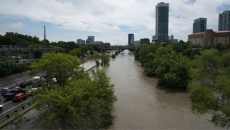Researchers in London, Ont., say they were able to detect awareness in a comatose patient with a brain injury – a finding they say "opens the door" to providing better care with the hope of more accurately predicting critically injured patients' prognosis for recovery.
A neuroimaging technique called functional near infrared spectroscopy (fNIRS) was used to shine light waves into three patients' brains to find activity in response to different commands, said a study published recently in The Proceedings of the National Academy of Sciences (PNAS) journal.
The patients had already been deemed clinically unresponsive, meaning they had not reacted when asked to give a thumbs up, wiggle their toes or open and close their eyes, said Karnig Kazazian, co-lead author of the study.
"By showing that some patients might still be 'in there' despite behaviourally showing no signs, you can imagine that this would really greatly influence that decision of whether or not you stay on life support or transition to passing away peacefully," said Kazazian, a research associate at Lawson Health Research Institute and the London Health Sciences Centre.
The fNIRS technology was first tested on more than 100 healthy participants to determine what tasks and commands were most effective at eliciting brain activity. The more light is absorbed, the more brain activity there is in a given part of the brain, Kazazian said.
When the technology was used on the three comatose patients, one showed significant neurological activity in the premotor cortex — the part of the brain that imagines movement — when they were asked to imagine playing tennis.
"Previous work from our group has shown that you have to be conscious in order to imagine playing tennis. You have to be 'in there' because that's not something that you just automatically do without any awareness," Kazazian said.
The researchers repeated this exercise five times to be sure the response wasn't just a one-off, he said.
The researchers also saw activity in the part of the patient's brain responsible for processing auditory information when they played "complex stories," Kazazian said.
In a less robust response, another unresponsive patient appeared to have the ability to passively perceive speech, the study found. A third patient showed no response to any of the task commands.
The findings build on previous research that suggests 15 per cent of comatose patients have some cognitive awareness even if they appear unresponsive, he said.
The functional near infrared spectroscopy is administered through a cap placed on the patient's head — eliminating the need to try to move them to another location in the hospital to do brain imaging, such as an MRI suite, Kazazian said.
He said the technology should be made available to intensive care units across the country, as it could help doctors and family members decide whether to continue aggressive care if the patient shows signs of awareness.
Dr. Derek Debicki, senior author of the study, said the results are promising, even though it's "very early days" in the field of detecting awareness in otherwise unresponsive patients and linking that to a prediction of if and how they will recover.
"Showing that this can actually be done in the ICU setting as a start really opens the door to be able to advance this technology further,” said Debicki, who is a neurologist specializing in neurocritical care at Western University.
Kazazian, Debicki and the rest of their research team are currently enrolling other patients, with consent from their families, to get a bigger sample size and learn whether or not the brain activity detected is associated with a patient's prognosis.
"(We want to) try to understand what is the process of recovery from coma or from severe brain injury, and are there any markers that can help us better predict what functional outcomes might look like?” Debicki said.
The team will also study whether or not the fNIRS technology can be used to communicate with patients while they are comatose, Kazazian said.






